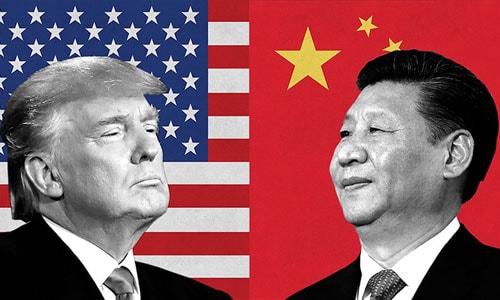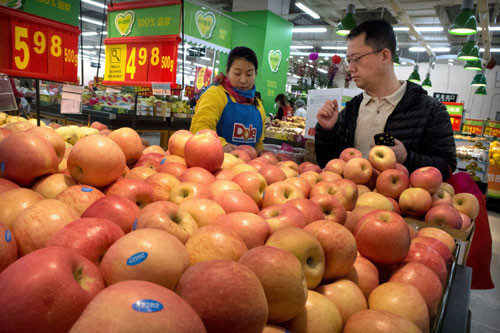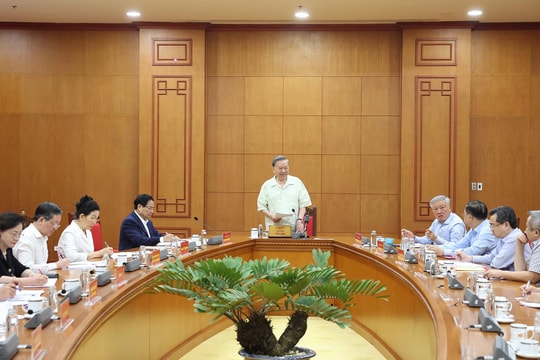The losers when the US-China trade war breaks out
Americans could be the first victims as the economic dispute with China escalates into an all-out trade war.
|
US President Donald Trump (left) and Chinese President Xi Jinping. Photo:CNN. |
The White House on April 2 criticized China for "harming US national security and distorting global markets" by increasing import tariffs of 15-25% on 128 US products. This is considered Beijing's retaliation after President Donald Trump on March 23 imposed a 10% tariff on aluminum and 25% on steel imports, mainly from China.
Derek Scissors, a scholar at the American Enterprise Institute, said that the current situation is just a "tit-for-tat" fight between the US and China, because the US's $50 billion tax package and China's $3 billion in retaliation are not much compared to the trillion-dollar economies of each country.
However, the danger is what happens next, as the two countries continue to trade blows and lead toan all-out trade war between the world's two largest economies, tpigNYDailyNews.
America First
"Trade wars are good and easy to win," President Trump, who has never started a trade war, wrote on Twitter before signing the order to impose tariffs on imports from China.
This is Trump's drastic action to fulfill his campaign promise to implement the "America First" economic policy. During his campaign, Trump accused China of stealing intellectual property and manipulating its currency, claiming that China was the culprit causing factories in the US to close, workers to lose income and jobs.
President Trump has promised that imposing tariffs on China will be the first step in an effort to narrow the huge trade deficit between the two countries. Many experts believe that China is increasingly dependent on the US market, with nearly 89% of Beijing's 2017 goods trade surplus coming from this market.
According to them, the US economy is much larger than China's. In 2017, the value of the US economy was nearly $7 trillion higher than its rival, and its growth was also stronger while China's economic growth was slowing.
While American economists are confident in the country's victory in the trade war with its rival, a similar feeling has pervaded Chinese public opinion in recent days.
Global Times, a supplement of the People's Daily, the mouthpiece of the Chinese Communist Party, argues that Chinese society is more united than the US in the face of the threat of a trade war, giving them a better chance of winning.
"Most Chinese people will support any countermeasures the government takes, as they know it is necessary to protect their interests. The US is divided on this issue, and the opposition will rise as the US suffers more damage from the trade war," the Global Times editorial said.
|
Imported apples from the US are displayed for sale in a supermarket in Beijing. Photo:AP. |
Many former Chinese officials and netizens have even called on the government to impose even heavier tariffs on US goods, saying the $3 billion tariff package is "nothing" compared to the $60 billion package proposed by Trump.
Commentator Isabella Beham ofValueWalkDespite its nationalistic tone, the Global Times article has hit a key point in current American politics. Since his election, President Trump has done little to bridge the deepening political divide in the United States.
Consequence
Even before the US-China trade war broke out, the American people were already suffering the first consequences. Americans have become accustomed to using cheap goods from China, so increasing tariffs on these goods will significantly increase the cost of living in the US.
"If tariffs on Chinese textiles increase, the cost of living in the US will increase, the Federal Reserve will therefore raise interest rates, slowing the economy and creating unemployment," explained Joseph Stiglitz, an economist at Columbia University.
American farmers have also been hit hard by the trade dispute. In Marathon County, Wisconsin, for example, 140 ginseng growers will be hit hard by China’s retaliation. Eighty-five percent of the county’s $30 million ginseng production is exported to China. Last September, Marathon County hosted an international ginseng festival that attracted visitors from mainland China and Taiwan.
With China imposing a new 15% tariff on ginseng, the lives of many Marathon County residents will be greatly affected. "This is a livelihood for a lot of people. We're still hoping that the tariff will be lifted," said Jackie Fett, president of the Wisconsin Ginseng Council.
If tensions escalate, China could continue to target more vulnerable US targets, including soybean farmers, who shipped $12.4 billion worth of products to China last year.
|
Soybean farmers in the US could suffer huge losses if the US-China trade war breaks out. Photo:MSA. |
Brent Bible, a soybean and corn grower in Lafayette, Indiana, appeared on television and urged the Trump administration to avoid a trade war with China. “We’re the ones caught in the crossfire,” he said.
In that situation, the ability of the American people to unite behind President Trump's efforts will be a big question, when they have to trade off their living expenses and essential livelihood needs, Beham commented.










.jpg)
